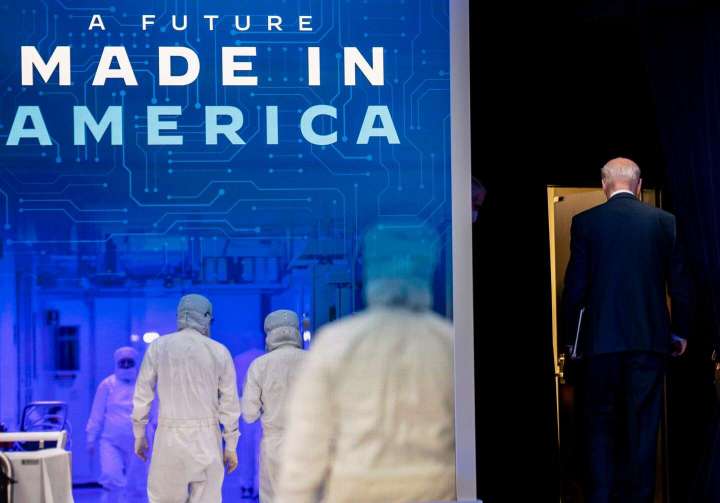After two years of work, Congress finally passed a bill to give $77 billion to the semiconductor industry and authorize (but not actually fund) hundreds of billions more in domestic research and development. The bill, while not perfect, is on the whole a wise investment. But when it comes to competing with China, the mission is far from accomplished.
What the Chips bill left undone on China

When President Biden signed the bill Tuesday, he said it would prevent China from dominating the semiconductor market and create American jobs. The bill’s supporters also argue that boosting domestic semiconductor manufacturing benefits national security by reducing the U.S. military’s dependence on foreign chips.
“The Chinese Communist Party actively lobbied against this legislation because they know this bill is bad for China and good for the United States,” said Sen. Todd C. Young (R-Ind.) on Tuesday. He and Senate Majority Leader Charles E. Schumer (D-N.Y.) were the main sponsors of the legislation, which garnered 64 votes in the Senate.
While it’s true Beijing urged Congress not to pass the legislation, the final version of the bill is not as tough on China as the Chinese government might have feared. That’s because lawmakers ultimately failed to address several issues related to China’s malign behavior.
“The Chips funding and Science Act provisions are important initiatives to enhance U.S. competitiveness,” said Michael Wessel, commissioner on the U.S.-China Economic and Security Review Commission (USSC), which is charged with overseeing the economic relationship between the United States and China. “But we have to do much more to address the China challenge.”
Several administration officials and lawmakers told me that the final bill, which was largely written behind closed doors after a convoluted legislative process, was the best Congress could do in this caustic political environment.
The new law’s $52.7 billion in grants and loans and $24 billion in tax breaks for semiconductor companies such as Intel and Qualcomm comes with few strings attached.
Biden insisted there were strong “guardrails” in the measure that would prevent tech firms from reinvesting funds in China, thereby undercutting the competitive goals of the bill. But many Republican senators called it a slush fund for the semiconductor industry. Said Sen. Rick Scott (R-Fla.), “It’s going to cause more inflation, more debt, and create more deficits. There is no accountability, it doesn’t make any sense.”
Tech industry lobbyists opposed stronger restrictions on the Chips money and fought against a bipartisan push to institute a system for reviewing American investments in China to ensure U.S. corporations don’t subsidize Chinese military gains. Several congressional officials told me that lawmakers friendly to Wall Street would not go along with such a review process. Administration officials said that the Biden administration supported including an “outbound investment” review and will turn to additional oversight by the Commerce Department, instead.
Several other good ideas in the House and Senate versions of the bill failed to make the final version. The House bill included provisions to increase visas for Hong Kong residents with advanced skills, to take advantage of the brain drain leaving China. Also dropped were several measures that would have helped American workers hurt by China’s unfair trade practices and closed loopholes that allow Chinese exporters to avoid U.S. taxes.
The USCC’s 2021 report identified other areas where the United States needs to up its economic game against China, including requiring greater transparency and accountability of Chinese firms that raise money in U.S. capital markets, tightening export controls and cracking down on Chinese espionage and influence operations that seek to buy off U.S. researchers and steal technology.
To be sure, each of these additional measures is politically controversial. Republicans see expansion of any immigration regulations as odious and have resisted certain trade reforms. Both parties also have members who see any crackdown on China’s relationship with Wall Street as a nonstarter.
In the meantime, the onus is on the Biden administration to tighten the screws. The White House can do a lot through executive orders to increase oversight of U.S. investments in China and thwart China’s attempts to dominate entire technology sectors in the 21st century. All it needs is the will to do so.
The political upsides for Biden are clear. Most voters support tougher relations with Beijing. The White House seems to realize (belatedly) that reducing tariffs on China sends the wrong signal for no benefit. Beijing has rejected all of the administration’s attempts to sit down and negotiate on these issues.
Fabricating more semiconductors here at home is long overdue and will have many benefits. But it doesn’t get us far in dealing with the broader economic threat from Beijing. China’s predatory investing, unfair trade practices and technological expansion are increasing. The vital effort to protect our economic and national security from China’s aggression must continue, and both parties must join the fight.






